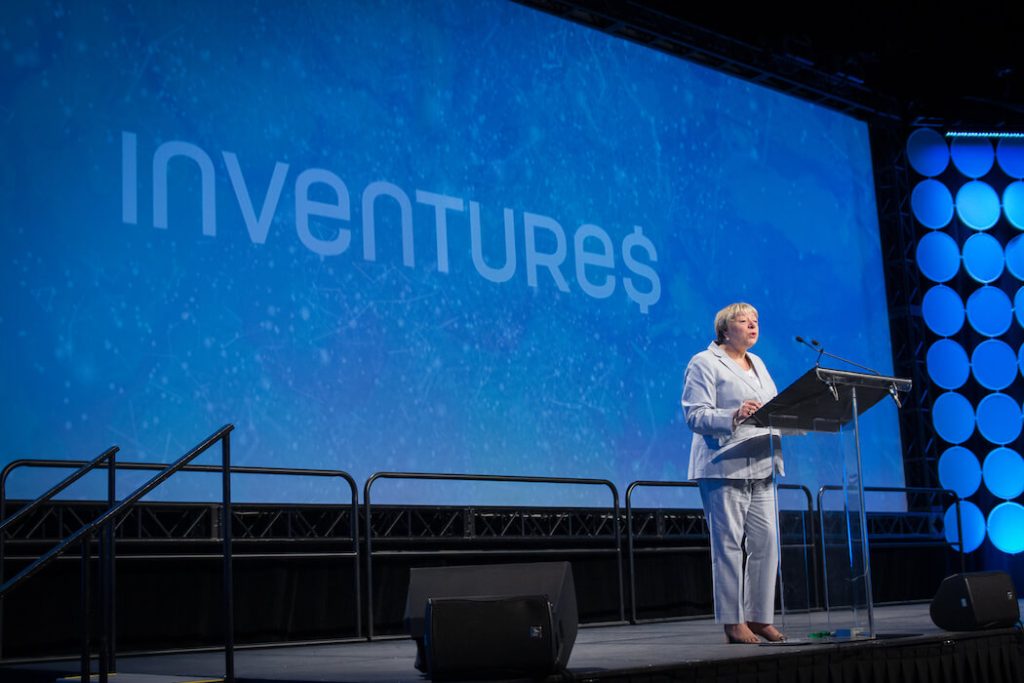“I truly believe this is going to become Alberta’s decade.”
The words spoken by Doug Schweitzer, Alberta’s minister of jobs, economy and innovation, onstage at the Alberta Innovates tech conference Inventures earlier this month.
Speaking to a crowd of thousands, Schweitzer added, “You guys are on the map and you’re winning.”
Being on the map is a fairly new experience for Alberta’s tech scene. Only in recent years have the maturing tech startups, increased investment capital, and provincial government buy-in led the province to become globally recognized as an emerging tech hub.
Alberta tech clearly has some steam. But with the resignation of Premier Jason Kenney, and Minister Schweitzer announcing he does not plan to run for re-election, the future of the province’s tech spending may be up in the air.
BetaKit spoke with stakeholders in the sector and gauged their opinion about how the political changes might affect the hard-fought relationship between Alberta tech and the provincial government.
“Tenuous to say the least”
Schweitzer revealed that he did not plan to run in next year’s provincial election just a few short days after Kenney announced he was stepping down as leader of the UCP, quickly squashing rumours that he may put his hat in the ring for Kenney’s job.
Schweitzer’s announcement was met with disappointment from stakeholders in Alberta’s tech sector, who now consider the minister a “champion” of tech after being appointed to the innovation portfolio in 2020.
The minister helped lead provincial spending on tech, and the creation of the Alberta Technology and Innovation Strategy (ATIS), which the provincial government launched as part of Budget 2022. So far, ATIS has committed $23 million for the development of a quantum hub at the University of Calgary and $30 million for artificial intelligence (AI).
While the relationship is ending on a high note, it didn’t start that way. Schweitzer himself admitted on stage at Inventures that the UCP’s relationship with the tech sector started out “tenuous to say the least.”

The provincial government’s recognition of the tech sector and resulting capital commitments came only after prodding from stakeholders with open letters and blunt frankness.
The province relented, in part, with the 2019 Innovation Capital Working Group, but hesitation extended into 2020 as the COVID-19 economic recovery council (which included former Prime Minister Stephen Harper) was created. Key stakeholders in the Alberta tech scene told BetaKit that the council was initially less than keen to invest in tech.
The push worked, however, and tech eventually became a key part of the province’s economic diversification efforts.
In April, Alberta launched its innovation strategy, which has already allocated $53 million between a quantum hub and artificial intelligence commitments. January saw the creation of a new immigration stream meant to help tech companies solve access to talent issues; Opportunity Calgary Investment Fund (OCIF) investments also brought international accelerators to the province.
Speaking with BetaKit, Schweitzer noted that when he became innovation minister the tech scene was already burgeoning. “When I first saw and engaged with the tech sector, they wanted recognition, they knew that they had something and they knew that they were going to be successful,” he said. “But there was just a little bit of extra support that they needed and just amplification of their message to really drive home, what their opportunities were in Alberta.”
Calgary Mayor Jyoti Gondek noted, “what’s really interesting about Calgary right now is we stopped reading the headlines about us and we started creating them ourselves.”
Just like starting over?
That the current relationship between the provincial government and its innovation ecosystem was so hard-fought makes Alberta’s upcoming political changes fraught. Put simply: will three years of work to get the government on board with tech be undone by the next election?
While many that BetaKit spoke with expressed confidence that the political turnover won’t affect government tech spending broadly, changes in leadership and the minister in charge of the portfolio inherently bring risk.
As was the case with the UCP and its 2019 cuts, new leadership will often pause spending to assess the previous government’s policies and commitments. Whether a new UCP leader continues the party’s majority after next year’s election or a new government comes in, they may face the same relationship problems that Kenney’s UCP party did initially. Even with the NDP signalling support for tech, changes in leadership run the risk of starting from scratch.
“The ignoring of technology or other parts of the economy is over in Alberta because they have felt the sting of what that actually costs.”
While people in the tech sector are mixed on whether the UCP will remain in power or the NDP will lead the province once again, most feel confident that innovation will remain on the agenda. The NDP notably has a history of innovation spending, and even tabled a bill earlier this year to create a direct investment venture fund (the bill was later shot down by the UCP in committee).
“I think that story is over,” said Thin Air Labs co-founder and managing partner James Lochrie. “The ignoring of technology or other parts of the economy is over in Alberta because they have felt the sting of what that actually costs.”
Terry Rock, president and CEO of Platform Calgary, echoed that sentiment, noting that part of the reason the provincial government has backed projects like Platform’s newly opened innovation centre is because the private sector “is so deeply behind it.”
There has been no word on who might replace Schweitzer if the UCP gets re-elected next year. However, the party is currently not devoid of individuals with a vested interest in tech. Minister of Service Alberta, Nate Glubish, spent the years before his political career investing and working with tech companies, and helped to oversee Accelerate Fund II through Yaletown Partners. He has recently taken part in provincial announcements related to innovation, such as the launch of the government AI hub led by AltaML.
Schweitzer also expressed confidence that his stepping back won’t have a major effect.
“One of the things that I’m really proud of is actually taking the narrative around diversification and taking the politics out of it,” he told BetaKit. “Every political party in Alberta right now is supportive of diversification in the technology and innovation space. We couldn’t have necessarily said that a couple of years ago, and I’m proud of the fact that everybody now is cheering for the tech and innovation space in Alberta and wants it to be successful.”
Lochrie also pushed away concerns. “Maybe you see policy changes that come up, whether they may be good or bad – and who knows who’s going to be in power after the next election – [but] we as entrepreneurs can’t depend on what government is going to do for us,” he said.
Keep the party boat going
The optimism about Alberta tech extended from Inventures to Collision last week. Over 70 Calgary-based tech companies attended the conference, which also featured sessions run by Calgary Economic Development, and a boat party hosted by Goodlawyer for 500 attendees.
At Collision, Brad Parry, president and CEO of Calgary Economic Development, argued that whatever happens with provincial leadership, the path has already been set for local tech.
“We’re really well-positioned now,” said Parry, who also heads up OCIF, which has been active in dolling out government capital to the innovation sector.

Parry argued that even with a possible recession on the horizon, provincial tech will be okay.
“You’ve got a government now, for the first time in history, talking about diversification of the economy,” he said. “You’ve got companies that are becoming unicorns in less than three years … That means something’s happening in the ecosystem that’s going to allow companies to not have to leave … to scale.”
Parry pointed to the maturation of the tech ecosystem as representation of the growth that was already underway when the UCP took over. That growth includes tech startups like Symend and Neo Financial, the Alberta Machine Intelligence Institute (Amii), more local venture funds, and an increase in venture capital from $37 million in 2017 to more than $561 million last year.
At Collision, Gondek also highlighted the importance of provincial and federal tech buy-in, calling it “table stakes” for any government. “If you want to be successful, you better up your tech game,” she said.
But government support is only one piece of the pie for Alberta tech, which seems confident it can stand on its own.
“We have to create the environments ourselves and whatever comes up from the government side of things is gravy,” Lochrie stated. “But we don’t depend on those types of things. We just take advantage of them when they’re available to us.”
Feature image courtesy Ethan Shaw.


